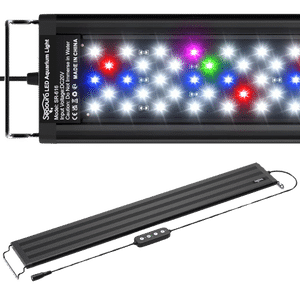Can Betta Fish See in The Dark?
“Can betta fish see in the dark?” is a question that has intrigued many betta enthusiasts and fish lovers alike. The short answer is “YES!”. But the captivating world of betta vision is much more intricate than a simple yes or no.
Dive deeper into this article as we explore the nocturnal nuances of betta sight, debunk common myths, and unveil the mesmerizing science behind their unique visual capabilities.
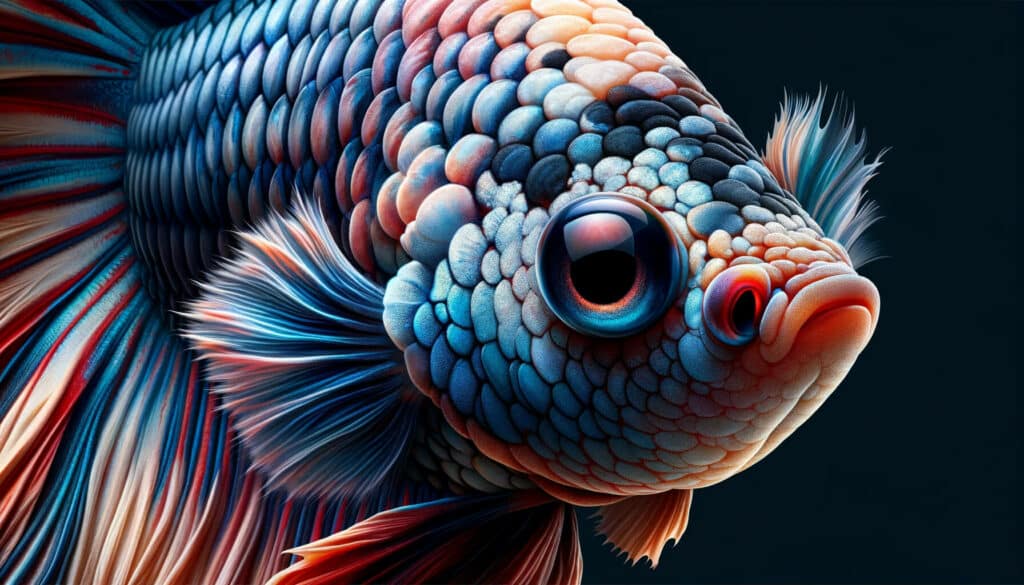
Table of Contents 🦑
A Quick Heads-Up… If you come across links on this page that take you to products on Amazon Associate or other partner stores, they’re affiliate links. This means if you decide to make a purchase, BettaReef earns a commission, but at no extra cost to you.

Bettas Eye Sight Explained
Betta fish possess a remarkable visual system that often goes unnoticed.
Like many of their aquatic counterparts, bettas have undergone evolutionary adaptations that equip them with specialized eyes. These eyes aren’t just about seeing, they’re about surviving and thriving in the fluctuating environments of their natural habitats. From detecting the subtle movements of potential prey to evading predators lurking in the shadows, the efficiency of their vision plays a pivotal role in their daily lives. Let’s dive deeper:
Compound Eyes
Unlike human eyes, fish eyes, including those of bettas, are often spherical. This shape allows for a wider field of vision, which is beneficial in underwater environments where threats can come from almost any direction.
Fixed Lenses
Betta fish, and most other fish, don’t have adjustable lenses like humans do. Instead, their lenses are fixed to focus on something, they move the lens closer or farther from the retina. This is achieved by specialized muscles.
Rods and Cones
Like human eyes, betta fish eyes have rods and cones. Cones allow them to see colors, while rods are more sensitive to light levels. Bettas are believed to see colors even more vividly than humans, especially in the blue and green spectrum, due to the type and distribution of their cones.
Upward Vision
The positioning of a betta’s eyes on its head allows it to see upwards effectively. This is an evolutionary trait that helps them spot potential food sources or predators from above.
Lateral Lines System
Though not a part of the eye, it’s worth mentioning the lateral line system when discussing fish sensory perception. This system detects vibrations in the water, allowing bettas to sense movements and changes in their surroundings, complementing their vision.
In conclusion, betta fish eyes are marvelously adapted to their aquatic environments, allowing them to see colors vividly and detect changes in light levels, ensuring they can navigate their surroundings, find food, and avoid predators.


The Dark And Lighting's Role in Betta Activities
The role of dark and light in betta fish activities is multifaceted and integral to their well-being. Just as humans require a balance of light and darkness for optimal health and mood, bettas too rely on such balance to thrive.
In the wild, bettas, experience the ebb and flow of natural sunlight, shaded by aquatic plants and trees. In captivity, replicating this environment becomes crucial. Proper lighting not only mirrors their native habitats but also influences their behavior, mood, and overall health.
Let’s delve deeper into the nuances of how dark and light plays such a pivotal role in Betta’s lives:
- Daily Rhythms: Light and darkness influence the circadian rhythms of betta fish. They are diurnal, meaning they are primarily active during the day and rest at night. An appropriate light-dark cycle helps them maintain this natural rhythm, dictating their feeding, mating, and resting habits.
- Feeding Behavior: Bettas are visual feeders, relying on their sight to spot food. Proper lighting helps them see and pursue their meals, whether it’s live prey or pellets.
- Breeding Activity: Lighting and darkness conditions can influence breeding behaviors. While there’s no conclusive evidence that a specific light cycle triggers breeding, an environment that mimics their natural habitat—complete with light and dark periods—can facilitate spawning behaviors.
- Coloration and Health: Appropriatedarkness and lighting can enhance the vibrant colors of betta fish. On the other hand, prolonged exposure to strong light or constant darkness can stress bettas, potentially leading to health issues and faded colors.
- Navigation and Exploration: Light allows bettas to navigate their environment, exploring the nooks and crannies of their tank, recognizing other tankmates, and establishing territories.
- Safety and Stress Levels: In the wild, bettas use sunlight to detect predators from above. In captivity, erratic or inappropriate lighting conditions can stress them out, affecting their health and well-being. A consistent light-dark cycle provides a sense of normalcy and safety.
In summary, light plays a critical role in various betta fish activities, from feeding and breeding to navigation and well-being. It’s essential for betta owners to understand and replicate the natural light conditions to ensure the optimal health and happiness of their fish.

Full Spectrum Fish Tank LED Light with Timer, Adjustable Brightness For Plants, White Blue Red Green Pink lights

Betta Sleep Through Light and Darkness
For any pet enthusiast, ensuring their beloved creatures experience comfort is paramount. When it comes to betta fish, their sleep patterns – often overlooked – are significantly influenced by lighting conditions in their habitat. By paying attention to these conditions, you not only guarantee a well-rested betta but also contribute to their overall health and longevity.
- Consistent Light-Dark Cycle: Just as humans have a circadian rhythm, bettas benefit from a regular 12-hour light and 12-hour dark cycle, simulating natural day and night.
- Gradual Transitions: A sudden switch from light to dark can be jarring. Consider timers or gradual dimming lights to emulate the natural dawn and dusk, ensuring your betta isn’t startled.
- Complete Nighttime Darkness: A pitch-dark environment during the night ensures uninterrupted sleep for your betta. If other light sources are unavoidable, think about using a tank cover.
- Use Red or Low-Wattage Blue Light: For those nighttime check-ins, red or low-wattage blue lights are minimally invasive, ensuring your fish’s sleep isn’t disrupted.
- Avoid Excess Ambient Light: Positioning is key. Keeping the tank away from persistent sources of light like streetlights can make all the difference in ensuring consistent sleep.
- Create Comfortable Hiding Spots: With plants, caves, or other cozy corners, bettas can find a secure spot to retreat and rest.
- Limit Stress: A serene environment, free from aggressive tank mates and with optimal water conditions, fosters better rest.
- Observe and Adjust: Keeping an eye on where and how your betta sleeps can offer valuable insights. Adjust the environment as needed based on your observations.
Dark-Light Cycle Tips:
- Avoid Sudden Changes in Light, Use timers to automate lighting, ensuring a consistent cycle.
- Ensure the tank isn’t placed in direct sunlight, which can cause rapid temperature fluctuations and contribute to algae growth.
In sum, understanding and replicating optimal lighting conditions plays a pivotal role in ensuring your betta fish thrives. It’s not just about brightness and darkness; it’s about crafting a holistic environment where they can rest, rejuvenate, and radiate their natural beauty.
Betta Fish's Common Night Behavior
- Resting Patterns: Unlike humans, betta fish sleep in a different way. They have resting periods where they remain relatively still, often near the bottom or tucked into plants. These restful states help them conserve energy and rejuvenate for the day ahead.
- Movement and Exploration: Even during the night, bettas can be sporadically active. You might spot them slowly exploring their tank, especially if there’s a hint of ambient light. This behavior is natural and is not always a sign of distress or agitation.
- Interaction with Tankmates: For those who keep betta fish with other tankmates, nighttime can be an interesting dynamic. Some bettas might become more territorial, while others coexist peacefully. It’s essential to observe and ensure that the betta isn’t being bullied or being the bully during these dim hours.

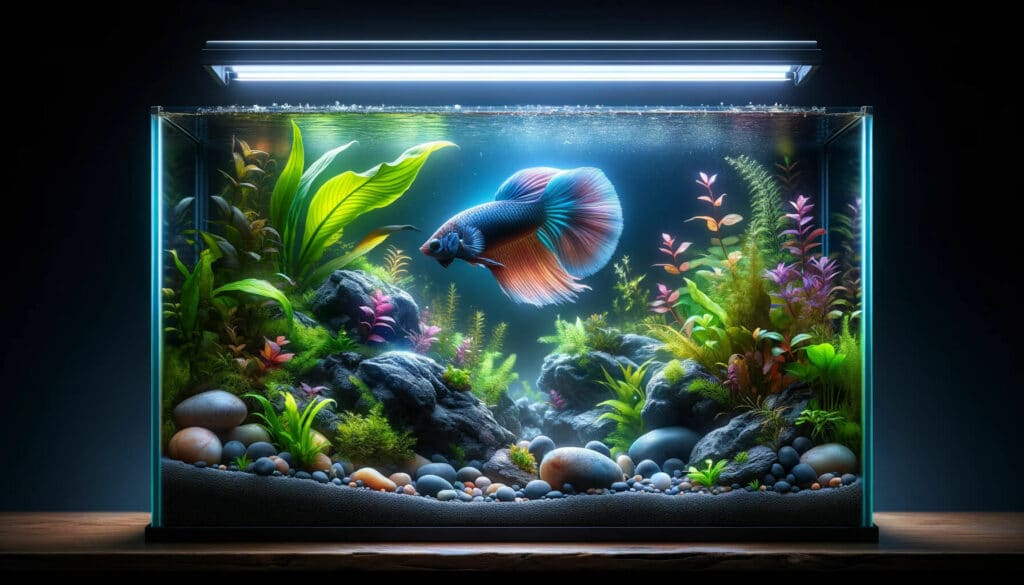
Boosting Betta Eye Health
When it comes to pet care, especially aquatic pets like betta fish, the finer details often make the most significant difference. Bettas rely heavily on their keen vision to interact with their surroundings. Optimizing your betta fish’s vision isn’t just about clarity, it’s about recreating an environment that mirrors their natural habitats.
By understanding their visual needs and health, we’re not just ensuring they “see” better, we’re elevating their overall quality of life. Here are some steps and considerations to help enhance and support your betta’s vision:
- Proper Lighting: Ensure the tank has a balanced light-dark cycle, mimicking natural daylight hours. LED aquarium lights that provide a full spectrum of light can be beneficial. Avoid abrupt changes in light, which can stress your betta.
- Tank Cleanliness: Regularly clean the tank to ensure clear water. Cloudy or dirty water can obstruct your betta’s vision and can lead to eye infections.
- Natural Decor: Incorporate natural plants and decorations that provide varying degrees of shade and light, resembling their natural habitats. This allows bettas to experience different light intensities, which can stimulate their vision.
- Avoid Sharp Decor: Sharp or abrasive decorations can injure your betta, potentially harming their eyes. Opt for smooth, rounded decor.
- Dietary Health: A balanced diet with essential nutrients can support overall health, including eye health. Foods rich in certain vitamins and minerals can be particularly beneficial.
- Monitor for Diseases: Regularly check your betta for signs of eye diseases like pop-eye or cloudiness. Early detection and treatment can prevent permanent damage.
- Limit Stress: Stress can weaken your betta’s immune system, making them more susceptible to diseases, including those that affect the eyes. Reduce stress by providing hiding spots, maintaining water quality, and avoiding overstocking the tank.
- Avoid Reflections: Constant reflections can cause a betta to flare frequently, which can be stressful. If your betta is continually flaring at its reflection, consider adjusting the tank’s lighting or background.
In conclusion, by ensuring an optimal environment and taking preventive measures, you can support and enhance your betta fish’s vision, contributing to their overall well-being and longevity.
Best 3 Lighting Types For Betta Fish Aquariums
When considering lighting for a betta fish tank, it’s important to ensure the type of light used is beneficial for both the betta fish and any plants you might have in the tank. Here are some of the best types of lights for betta fish tanks:
LED Lights: These are solid-state lights and are the newest type of light for aquarium use.
- Energy Efficiency: They consume less power, saving on electricity bills.
- Durability: Typically last longer than other types of lights. They can have a lifespan of up to 50,000 hours.
- Customizable Spectrum: Some advanced LED systems allow users to adjust the light spectrum, replicating different times of day or water conditions.
- Low Heat Output: LEDs generate minimal heat, making it easier to maintain stable water temperatures.
Fluorescent Bulbs: These bulbs work by passing an electric current through a gas, producing ultraviolet light. This then illuminates the phosphorescent coating inside the bulb.
- Broad Spectrum: Especially beneficial for live aquatic plants.
- Even Illumination: They offer consistent and smooth light distribution.
- Less Heat: Compared to incandescent bulbs, fluorescent bulbs generate less heat.
Moonlight or Night Lights: Low intensity, often blue or red LEDs used to simulate moonlight.
- Night Viewing: Allows owners to observe nocturnal fish behaviors without disturbing them.
- Low Light: Doesn’t interfere with the fish’s sleep cycle.

Can Betta Fish See in the Dark FAQ's
Q: Do Betta Fish Like Being in the Dark?
A: Betta fish appreciate a balanced light-dark cycle, similar to the natural day-night rhythm. Prolonged darkness can be stressful for them, just as continuous light can be. It’s essential to mimic a natural environment by providing them with periods of light and dark.
Q: Can Betta Fish See in Complete Darkness?
A: While betta fish have some ability to perceive their surroundings in low light due to their specialized eyes, complete darkness limits their vision. They aren’t equipped with “night vision” like some animals, so they rely on ambient light to see.
Q: Can Betta Fish See Color?
A: Yes, betta fish can perceive colors! Their eyes are equipped with cells called cones that allow them to detect various color wavelengths. This ability helps them interact with their environment, recognize potential mates, and even differentiate between food types.
Q: Can Betta Fish Eat in the Dark?
A: While it’s possible for bettas to eat in low light conditions, it’s best to feed them during their active periods in the light. This aligns with their natural feeding patterns and ensures they can see and catch their food efficiently.
In Conclusion
Understanding the intricacies of betta fish vision, especially their ability (or lack thereof) to see in the dark, is crucial for any betta enthusiast. By ensuring that their lighting conditions mimic natural environments and cater to their visual needs, you not only enhance their well-being but also create an environment where they can thrive.
Remember, the question isn’t just, “Can betta fish see in the dark?” but also how we, as caregivers, can optimize their surroundings for their best life. Dive deeper into their world, and you’ll discover the fascinating ways bettas interact with light and darkness.

Delighted to have you here at BettaReef! This place is a treasure trove of knowledge about Betta fish, Betta Care, Health, Gear, and much more from the wonders of aquatic life. My journey in this fascinating world began when I was just 8, and now, as a seasoned hobbyist, I’m here to help fellow Betta enthusiasts create a thriving Betta environment for a healthy life.
I’m committed to delivering high-quality content, backed by a stringent editorial process. Each product review is based on real-life usage and practical analysis, ensuring that you get insights and advice that truly matter.
Related Blog Posts:
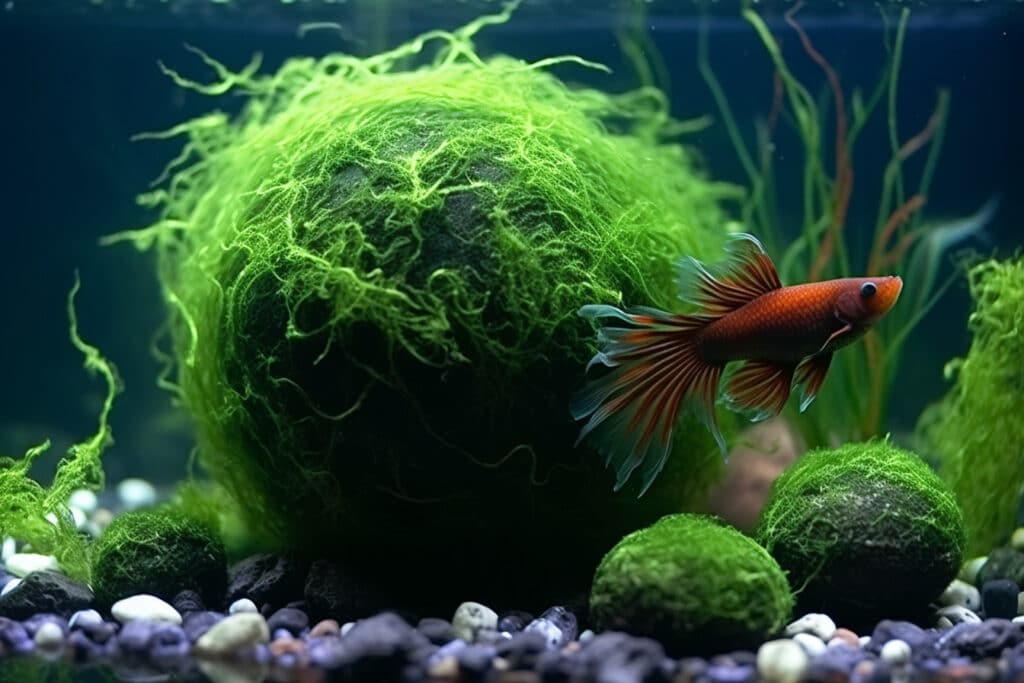
Java Moss for Betta Fish, Is It Good?
Home Java Moss for Betta Fish, Is It Good? Hello, aquatic enthusiasts! Welcome to our
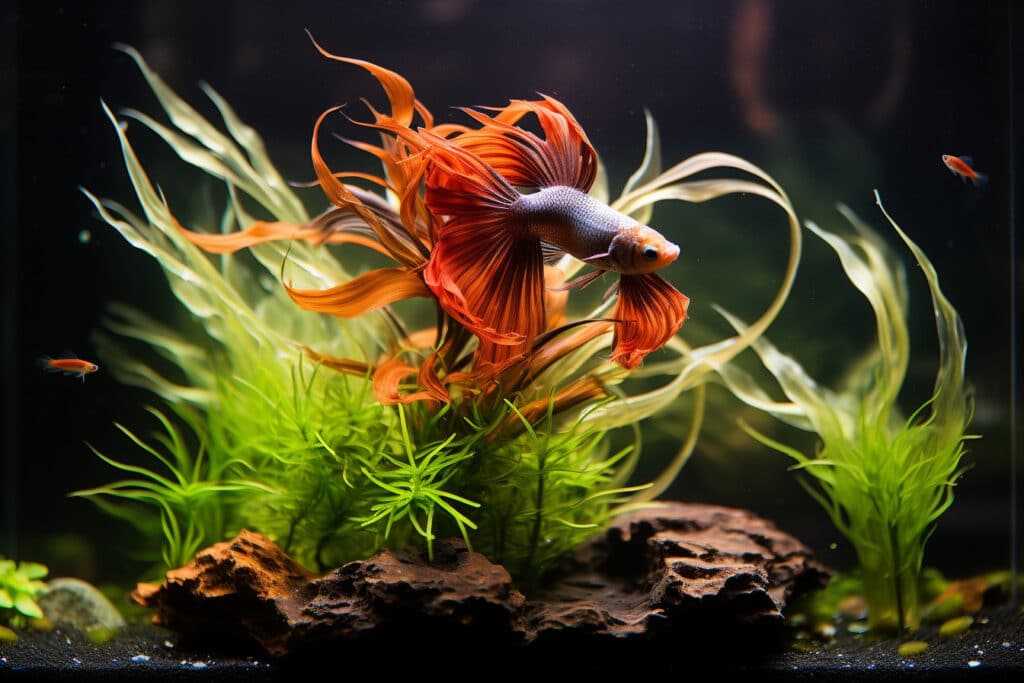
The Best Aquatic Plants For Betta Fish
Home The Best Aquatic Plants For Betta Fish Aquatic Plants for Betta Fish: Uncover the
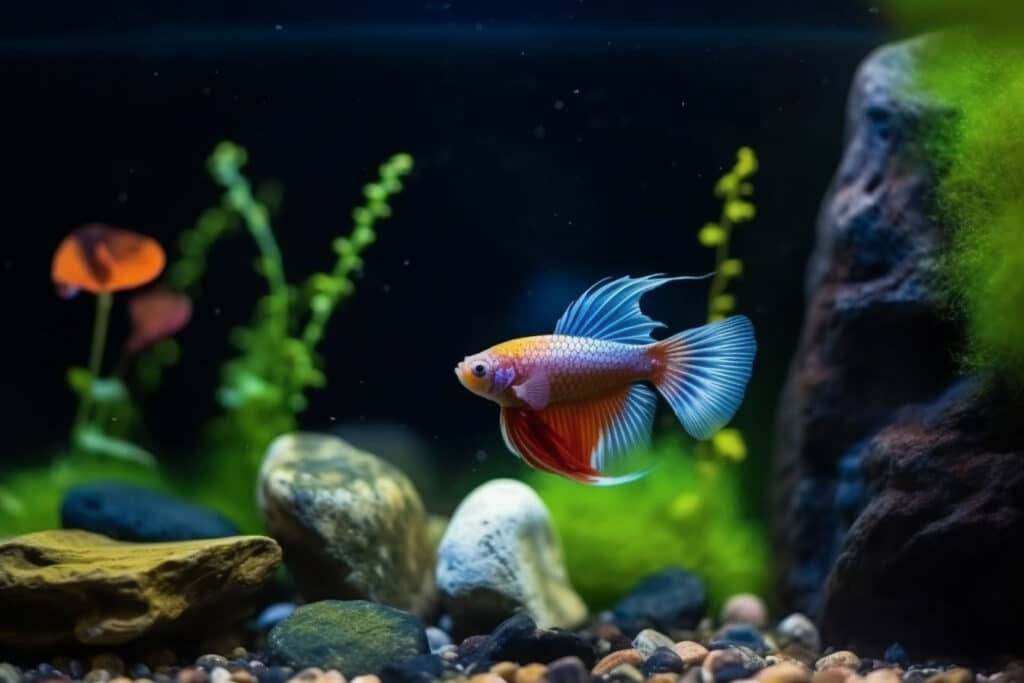
How to Choose Aquarium Rocks for Betta Fish Tanks, The Best Guide.
Aquarium Rocks for Betta Fish Tank Setting up a Betta fish aquarium is more than

